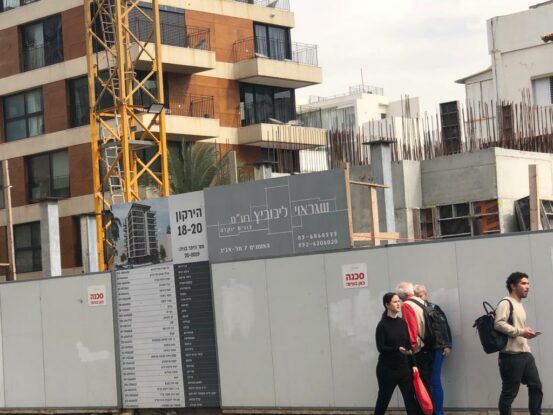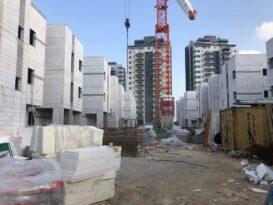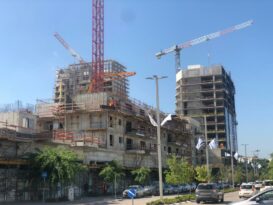The sharp surge in interest rates has succeeded in halting the price increases in the Israeli housing market, and the most recent home price index indicates the beginning of a change in trend. This is particularly true of the new home market, where prices have fallen by 2.4%. In which areas can you now enjoy discounted prices? And can we expect the prices of homes in Israel to continue to fall?
What has been in the air for many months, received an official stamp two weeks ago – after nearly two years of sharp price increases, the prices of homes in Israel have halted, or to be precise – almost halted. This is shown by the most recent home price index published by the Central Bureau of Statistics in mid-January, which showed an increase of only 0.3% in home prices during November. This follows a year in which prices increased by 1%-2% each month, and a record 20.3% year-on-year (October 21 to October 22).
However, the most dramatic figure of the latest index comes from the new apartment sector, that is, homes sold by developers. According to data from the Central Bureau of Statistics, there was a sharp monthly decline of 2.4% in the price of new construction in November.
The reasons for the change in trend are clear and identified. The most important of these is a series of seven consecutive interest rate increases by the Bank of Israel, which raised its rate from the level of 0.1% that it had been subjected to for more than a decade, to 3.7%, and the prime interest rate from 1.6% to 5.2%. The new interest rate increase led to a drop in the number of transactions nearly six months ago, but despite the decline, prices astoundingly continued to climb for several months.
The data now show that while the prices of pre-owned homes have continued to climb, developers are beginning to compromise on price, routinely offering discounts that are disguised in various “promotions.” Here, too, there is no surprise: The real estate industry is a credit consumer on a huge scale. When a medium-sized project is backed by tens of millions of shekels, every increase in interest rate translates into millions of shekels added to the financing expenses of the project. Under such circumstances, developers prefer to accelerate the pace of sales and reduce their debt as quickly as possible.
It should be borne in mind that after such a long period of sharp price increases, even after offering reductions of 2%-3%, home prices remain tens of percent higher than they were during the period when the land was purchased by the developer – two, three or four years ago, and that these are still very profitable transactions.
However, it is important to note that the relative decline in the prices of new homes is not across-the-board, and at this stage, it is not occurring in all regions. In high-demand areas where the supply of apartments is low – such as central Jerusalem and Tel Aviv, developers are able to maintain the current price levels. However, on the outskirts of the central region, in peripheral areas, and in cities where the volume of new construction is high and demand is limited –the developers’ ability to maintain the same price level is somewhat limited. These cities include, for example, Netanya, Ashkelon, Or Akiva, Harish, Yavne, and Rosh Ha’Ayin.
Will the halt in prices reflected in the most recent index lead to a continued decline in home prices? As we know, prophecy has been given to fools and there’s no way of knowing what the future holds. However, it seems that if the Bank of Israel maintains the current interest rate level, or even continues to increase it, there is indeed a good chance that in the coming months, we will see a moderate decline of up to 5% in home prices, and here too it is important to emphasize that it will not necessarily be seen in all regions.
The history of the past 15 years of the Israeli home market shows that while the price declines are moderate, the waves of price increases are much sharper. One of the reasons for this is that in times of price moderation, and a subsequent decline in demand, the volume of new construction is also then reduced. This can be seen clearly today when after an annual rate of construction of 80,000 new homes per year at the end of 2021 and the beginning of 2022, the pace of building starts dropped towards the end of 2022 to 60,000. The result of this dynamic is that on the day buyers return to the sales offices—which will happen sooner or later—they will meet less supply of homes, which will lead to a renewed increase in prices.
Three such periods where there was limited demand without sufficient supply are recalled from the past 15 years: one in 2008 – when the global subprime crisis led the public to withdraw its savings from the capital market and inject it into real estate; the second in 2015, when the “zero VAT” initiative on the purchase of a new apartment for first home buyers promoted by the Minister of Finance at the time, Yair Lapid, led to a halt in sales during the months of its promotion, and finally, when it was not implemented, masses of buyers rushed to the sales offices; and the third period was just recently at the time of exit from the coronavirus crisis, in the second half of 2020. In all cases, the same waves led to an extreme increase in the prices of homes in Israel, due to excess demand.
The bottom line is that the coming period may be a fairly rewarding period for those who wish to purchase an apartment in Israel, to do so at a more affordable price, taking advantage of a difficult period for the sellers – whether it is the developers of a new project or the seller of a second-hand apartment who must sell. Such periods are quite rare in the Israeli market and those interested in buying a property should take advantage of them, before the arrival of another wave of demand.
Are you interested in buying a home in Israel? Whether you are taking the first step toward a permanent move, looking for a vacation apartment or retirement residence, or making a financial investment, Buyitinisrael will help you find the property that is right for you. Drop us a line, when you’re ready to talk!







